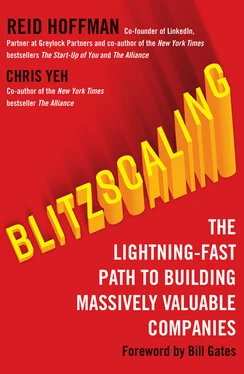When the Airbnb founders first met, Paul Graham, the highly regarded founder of the start-up accelerator Y Combinator (YC), told them flat out that their idea was terrible. “People are actually doing this?!” he incredulously asked. When Brian told him yes, people were, in fact, renting out their living spaces for a night, Graham’s response was “What’s wrong with them?”
Still, Graham had accepted the Airbnb guys into the three-month-long YC program. Not because he was inspired by their Airbnb business, but because he was impressed by the hustle of the founders. He loved the (now famous) story about how Chesky and his cofounders managed to pay the bills while trying to get Airbnb off the ground. It was 2008, a US presidential election year, so they created and sold special-edition cereals called “Obama O’s” and “Cap’n McCains”—a sugary parody of (or tribute to, depending on how you look at it) that year’s candidates Barack Obama and John McCain. The creativity and persistence displayed by the Airbnb founders as “cereal entrepreneurs” got them in the door at YC; once in the program, they refined their business and were able to persuade two leading venture capital firms, Sequoia Capital and Greylock Partners (where I am a general partner), to invest.
Now, nearly four years later, it seemed like all the hard work was finally starting to pay off. Having celebrated its millionth booking, Airbnb had plenty of working capital, and it was clear that the concept was valuable.
But when you’re successful, you attract competition. And sometimes that competition represents a deadly threat.
In Airbnb’s case, that threat was three brothers from Cologne, Germany: Oliver, Marc, and Alexander Samwer. They had become billionaires by analyzing successful US companies, rapidly creating copycats in Europe, and, in many cases, selling those “cloned” companies to their original American inspirations. In other cases, the Samwers actually held on to and built out their clones; Zalando, the “Zappos of Europe,” had over ten thousand employees and was worth more than $10 billion in 2017.
Their first success was Alando, an eBay knockoff that they were able to sell to eBay for $43 million, just one hundred days after launching it. The Samwer brothers then invested in the German versions of YouTube (MyVideo), Twitter (Frazr), and Facebook (StudiVZ) before founding their own start-up studio, Rocket Internet.
In early 2011, Brian and his team started noticing that Airbnb users were being spammed by a new company named Wimdu. Wimdu had apparently just received $90 million—the largest investment in a European start-up to date—from none other than Rocket Internet and Kinnevik, a major Swedish investment company that had partnered with the Samwer brothers.
The problem? Wimdu’s business model and website looked like a knockoff of Airbnb’s.
Wimdu was founded in March 2011, and, within weeks, the Berlin-based company had hired a staggering four hundred employees and opened twenty offices across Europe. Meanwhile, the original, but much smaller, Airbnb had raised only $7 million, had just forty employees, and operated out of a single office in San Francisco. As a first-time CEO, Brian wasn’t even sure what was involved in opening a second office, let alone dozens more on another continent.
Brian also knew that if Wimdu was able to capture and dominate the European market, Airbnb might not survive. “If you’re a travel site and you don’t cover Europe, you’re dead,” he told us in 2015, when he visited the Technology-Enabled Blitzscaling class we taught at Stanford University.
The Samwer brothers had named their price: Airbnb could have Wimdu in exchange for a 25-percent stake in Airbnb. Now Brian faced a difficult decision, with painful consequences regardless of what option he chose.
In response, Brian turned to one of his favorite decision-making techniques: reaching out to the world’s leading experts. His first call was to the CEO of Groupon at the time, Andrew Mason. The leading daily deals company had had a similar experience the previous year: In December 2009, the Samwer brothers had launched CityDeal, their Groupon lookalike. Six months later, Groupon paid a nine-figure price, roughly 10 percent of its valuation at that point, to acquire this competitor.
Here was the question weighing heavily on Brian and his team: Should Airbnb follow Groupon’s strategy and just buy the knockoff company? Brian’s gut instinct was to say no. Integrating Wimdu’s finance-centric and metric-driven team could harm Airbnb’s design-driven culture. He was also reluctant to reward what he saw as a legal extortion racket rather than a sincere attempt to create value in the market.
Yet Brian felt he had an obligation to consider the offer. Mason had told him that despite the many problems the CityDeal acquisition had brought, it had also accelerated Groupon’s progress into the European market, which ended up accounting for nearly 30 percent of its global sales. It could easily be argued that giving up 10 percent of Groupon for CityDeal was actually a good deal. But perhaps emboldened by their successful CityDeal gambit, the Samwers were asking for a far larger share of Airbnb—a full 25 percent.
On the other hand, Airbnb could reject the offer and instead take on the aggressive Samwer brothers in a head-to-head competition. But Wimdu had the home-turf advantage, not to mention ten times the number of employees and more than ten times the amount of invested capital. Competing against them would be one hell of an uphill battle.
Tired of the fund-raising grind, especially its emotional toll, Brian wondered whether he had it in him to take on this new and likely bruising fight. But he and his team had spent eighteen seemingly fruitless months working on Airbnb before entering Y Combinator, racking up tens of thousands of dollars in credit card debt. After all the blood, sweat, and tears, were they really willing to give up a quarter of their company?
Ultimately, Brian decided not to buy Wimdu, swayed in part by the arguments of his key advisers. Facebook founder Mark Zuckerberg counseled him to fight. “Don’t buy them,” he said. “The best product will win.”
YC’s Paul Graham gave similar feedback. “They’re mercenaries. You’re missionaries,” he told Brian. “They’re like people raising a baby they don’t actually want.”
When Brian reached out to me for my advice on the situation, I too advised him not to buy Wimdu. The key issue wasn’t the price and dilution, but the way a merger could pose impediments to speed and success. “Buying [Wimdu] adds a substantial amount of integration risk, which tripped up Groupon after buying CityDeal,” I told him. “Merging company cultures and company management could create potentially fatal risks, especially if it slows us down. With Airbnb, we have a business that is already benefiting from network effects. We can win.” I stand by that advice today.
In the end, Airbnb’s founders realized that they wanted to take on the Samwers—and they wanted to win. But how?
The key was an aggressive, all-out program of growth that we call blitzscaling. Blitzscaling drives “lightning” growth by prioritizing speed over efficiency, even in an environment of uncertainty. It’s a set of specific strategies and tactics that allowed Airbnb to beat the Samwer brothers at their own game.
Just a few months later, determined to acquire the resources needed to outscale the Samwers, Brian raised $112 million in additional venture capital. Airbnb then embarked on an aggressive international expansion plan, including the acquisition of Accoleo, a smaller and more affordable German Airbnb clone, that allowed Airbnb to compete directly with Wimdu in its home market. By the spring of 2012, Airbnb had opened nine international offices, setting up shop in London, Hamburg, Berlin, Paris, Milan, Barcelona, Copenhagen, Moscow, and São Paulo. Bookings had grown ten times since that previous February, and in June 2012 Airbnb announced its ten millionth booking.
Читать дальше












